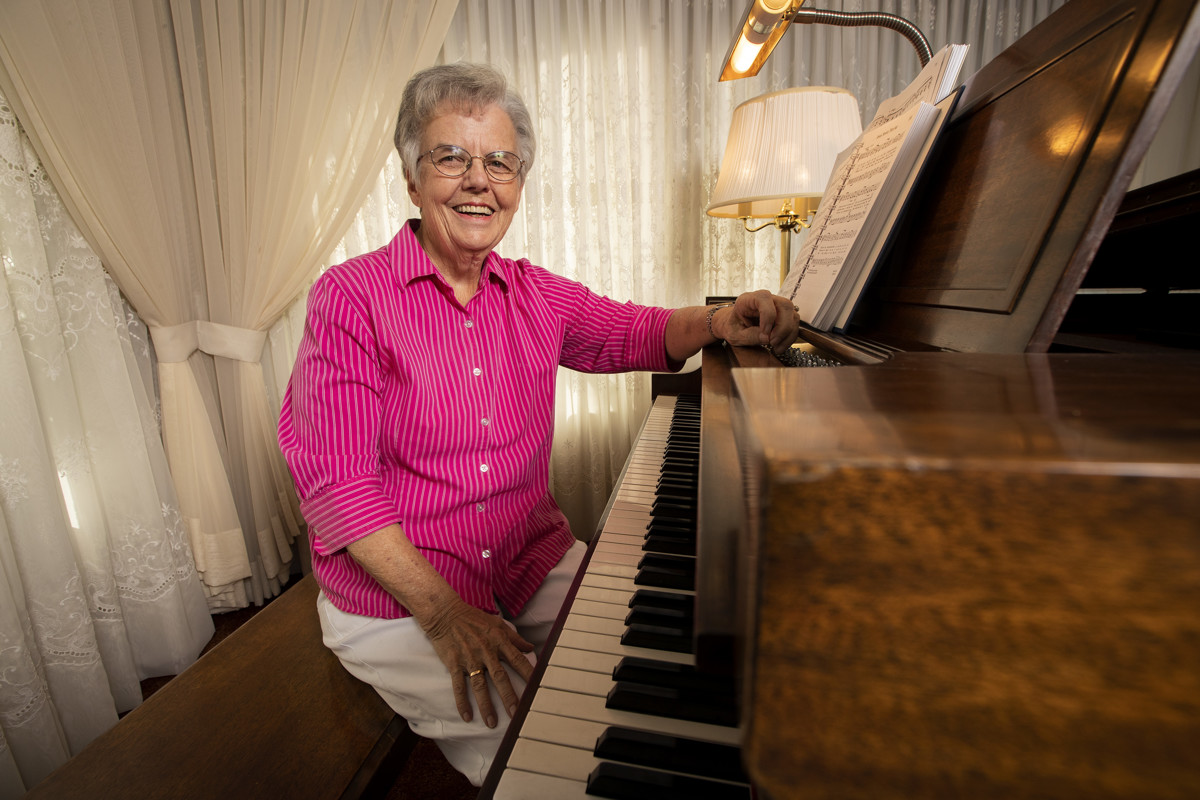
Who knew that at age forty a woman would begin writing songs and end up making such a huge impact on millions of people? Janice Kapp Perry has always been musically inclined, but it wasn’t until she was injured playing basketball, and stuck in bed, that she decided to give writing music a try.
The Kapps were a talented family; her parents played for all the local dances, her siblings are musical; including her brother, Gary Kapp, more well known as an artist. Her cousin is Joy Lundberg, who she has written many songs with.
Janice was born in Ogden, Utah and grew up in Oregon on a farm. The family was very sports-minded, in particular, BYU sports. Her mother would sit out in the car, in any weather, listening to a BYU game on the radio. Janice was known for her “wicked pitch”. Hours were spent playing and watching sports. Music, while clearly being important to the family, was a distant second interest.
While still young, Janice was challenged by a friend to write a song. Her friend didn’t think she could do it. Janice had never tried before but thought she might be able to pull it off. A while later, she presented her friend with the song and together, with the friend’s sister, sang it for a musical number in church.
She attended BYU, majoring in Music Education, and met and married her husband.
For a little extra money, she played in bands. Janice plays several instruments, and while playing in these bands she would often move around, playing a different instrument for the evening. She preferred playing the drums though because by wearing a headset she was able to listen to sports games and call out the scores occasionally.
Over the years, she coached teams, served as Sports Director in church, was always heavily involved in one game or another. Until during a basketball game she broke her ankle and was forced to go home and sit for weeks.
Her Bishop came over and, seeing that she didn’t have anything else to do, asked if she would mind writing music for the roadshow. She said, “Sure”. And just like that, she started cranking out the songs we love so much today.
The method she uses to write her music is through much scripture study, pondering, and prayer. As she searches for truths, ideas will come to her. She pulls the words together first, then while vacuuming or going about her day, the music comes. Her goal is always to write simple songs that anyone can play, and as a means to bear testimony.
As she continued writing songs—just for fun, someone suggested she put together an album and sell it. She didn’t know the first thing about that, but learned how, used her children, and kept composing. They sold all the albums they had made. Her first published song was Where is Heaven. After writing another song, she was looking for a title for it when her husband pointed out some cross stitched words Love Is Spoken Here. When asked to write a “fight song” for a large children’s choir singing in the Marriott Center, she wrote The Army of Helaman. The BYU football team sang this song for her on her birthday.
One time she wrote a song about Christ and sent it to a Christian publication. It was rejected because she was Mormon and probably didn’t understand enough about Christ to satisfy their religious standards. This song became No Ordinary Man.
A Child’s Prayer has received more compliments than any other song.
Her life has not been without difficulty. Her youngest son was stillborn. Her belief in the hereafter gives her strength with the knowledge that she has someone waiting for her in the Celestial Kingdom, so she must live her life worthy to join him there.
Three fingers have given her trouble over the years. She can’t really use them to play the piano or type. She asks her sister to help with piano playing and her husband is always at the ready to print up a copy of a new song.
She has collaborated with Senator Orrin Hatch, writing music to his poems. These have been sung nationally and locally to much praise. She sang for years with the Mormon Tabernacle Choir. And she served, with her husband, in the Santiago, Chile Mission, where they graduated twenty-four people in conducting and accompanying classes.
While a niece, dying of cancer, was preparing for her own funeral, she came across a poem that Pres. Hinckley had written called What Is this Thing Man Calls Death. She asked Janice to write music to it, so it could be sung at her funeral. A letter was sent to Pres. Hinckley asking for permission to write the music. She received permission and began writing the music. Another letter was in transit asking permission to record the song when her niece died on a Saturday. Pres. Hinckley died the next day, on Sunday, and the letter granting permission arrived on Monday. This song was sung at the niece’s funeral, as well as Pres. Hinckley’s funeral. A copy of this music is in the February 2010 issue of the Ensign.